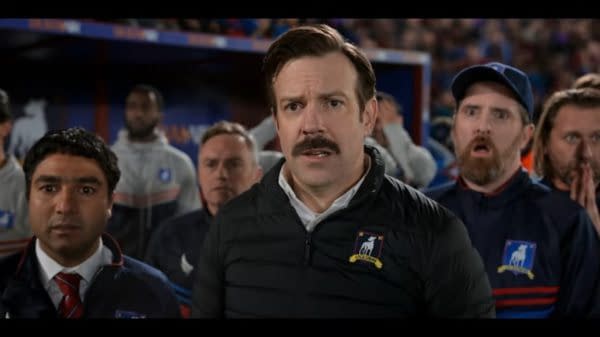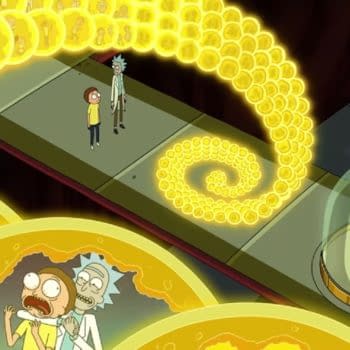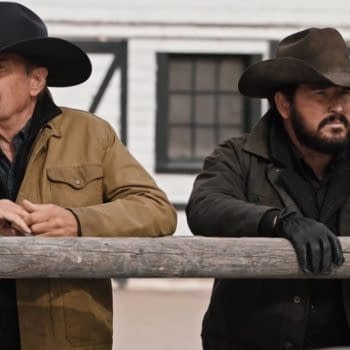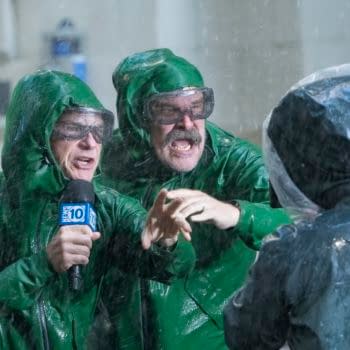Posted in: Apple, TV | Tagged: apple tv plus, jason sudeikis, Nick Mohammed, opinion, ted lasso
Ted Lasso Season 2 Finale Heel Turn Caps Off Masterful Season
Ted Lasso Season 2 has been a masterclass in storytelling, character development, and pulling off a satisfying show that people look forward to tuning in to week to week. And one of the most satisfying character arcs has been watching Nate "The Great" Shelley (Nick Mohammed) as he has transformed from the timid equipment manager bullied by the players we met in Season 1. This article contains major spoilers for Season 2 of Ted Lasso, especially its final two episodes, so if you're worried about those please go watch those episodes and then come back. We'll be waiting. All caught up? Great.
With the customary spoiler alert out of the way, this heel turn has been telegraphed for a long time. This shouldn't come as any major surprise since the groundwork for this has been laid ever since Nate started getting an inflated ego reading his positive press mentions. When reading tweets people were sending about him and then finally encountering a negative one (this is Twitter AND the real world: the main problem with this show continuing to be that it has overall far too positive a spin on humanity) Nate takes out his anger on an easy and nearby target: Will, his replacement as equipment manager.

But truly this turn is planted even further back in the episode where we meet Nate's mother and father. Nate's father is mean, dismissive, abusive. And these are the seeds from which Nate's turn to become Ted Lasso's greatest villain will grow. Most importantly, this goes to the themes and meta-commentary of Ted Lasso Season 2, which we should basically subtitle "Daddy Issues." Throughout the season we see how relationships with fathers affect everyone. This comes to the dramatic head at Rebeccas's father's funeral, wherein tandem she confronts her mother about long-secreted-away memories of her father's cheating as Ted (Jason Sudeikis) bares his soul to Dr. Sharon about his father's suicide.
But all through the episode, we get more. With Sam's father and their relationship on one side and Jamie's on the other and Ted in the middle contemplating his own relationship to his own son… and his adopted family at AFC Richmond. Nate's tearful confrontation with Ted at halftime of their final game was so powerful, telling him how Ted made him feel so special and then abandoned him. For someone starved for paternal approval like Nate, to have felt abandoned by Ted must have felt like a betrayal indeed.
And then along came that great Satan, the god-damn-pater-familias of the AFC Richmond empire, Rupert. And there he was, on numerous occasions, whispering in Nate's ear like a serpent, seducing Nate to the dark side. We have to see Rupert as a father– THE father in many ways–to now unlock the metatext of the show. He literally fathered a child with his new wife, the only character to have an actual child other than Ted Lasso himself.
And we must also see Rupert as the opposite of Rebecca. While she initially hired Ted Lasso to coach AFC Richmond as a joke and to ruin the thing her cheating ex-husband loved, Rupert has done the exact same and worse. Rebecca began to #Believe in both Ted and belief itself. Rupert tried every way to then sabotage Rebecca and the team, now including buying another team to compete against them. Rupert turned Nate: a dark father figure to replace both his actual abusive father and the light side father Ted Lasso who can't possibly be there enough for him. But his kindness is actually poison– bred from the same toxic masculinity swamp that bred Nate's father.
It's all very Greek myth. It's also all very Star Wars.
But these seeds were planted. They were planted long ago and took a long time to bear fruit. And now they have. And by Nate's now silver-tips and black suits signifying his switch to the dark side, we wonder if Ted Lasso can redeem him, setting up Season 3 as a Return of the Jedi style arc with roles reversed. This has been masterful storytelling where plot speaks to character, character arcs speak to themes, and themes weave together to present a single cohesive narrative. Thank you, Ted Lasso. You and all your daddy issues.















